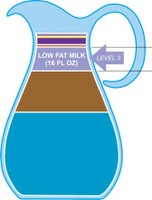Level 3

Milk
For children, milk is the current key source of vitamin D and calcium and is an excellent source of high-quality protein. Low-fat and skim milk, including low-fat yogurt drinks, can contribute to a healthy diet, but they are not essential. Fortified soymilk is a good alternative for individuals who prefer not to consume cow’s milk, although consumers should be aware that soymilk provides about 75 percent of the calcium available from milk. Yogurt drinks have lower lactose content than milk and may be preferred by individuals with reduced lactose tolerance. In general, low-fat dairy beverages and fortified soymilk provide an important source of protein, calcium, and other essential micronutrients.
The 2005 Dietary Guidelines for Americans Committee performed a detailed review of this topic and concluded that there was not sufficient evidence that milk consumption reduced, or prevented, weight gain.
A second issue relates to bone health. The Dietary Guidelines Committee also evaluated seven random trials and 32 observational studies exploring the relationship between milk intake and bone health. There are important benefits of higher calcium intake on bone mineral density but these are not maintained if the high intake is reduced.
Milk is an important source of calcium and is the key source for vitamin D from fortification, particularly for children age 6 to 18 years, when calcium requirements are higher. Milk products are also important contributors to the intake of essential nutrients in the diet of children and adolescents.
The Panel recommends 0 to 16 fluid ounces of low-fat and skim milk and soy beverages daily.
USDA’s MyPyramid guidelines for food intake recommend three servings per day of low-fat or fat-free milk, yogurt, cheese, or other foods made from milk that retain their calcium content. The one or two servings of low-fat or fat-free milk recommended by the proposed Healthy Beverage Guidelines also count as one or two servings of milk under the MyPyramid guidelines.
Calories and Caffeine Content of Milk
| Calories* | Caffeine (mg)** | |
| Reduced-Fat (1.5% or 1%) and Skim Milk | ||
| Milk (1% Fat Vitamin A Fortified) | 153 | 0 |
| Milk (Skim Vitamin A Fortified) | 125 | 0 |
| Soy Beverages | ||
| Silk Soy Milk, Plain | 150 | 0 |
| Silk Soy Milk, Vanilla | 150 | 0 |
| *Amount per 12 oz. (354.882ml) serving **Amount per 12 fl. oz. (335ml) serving |

